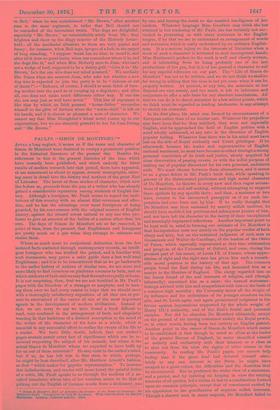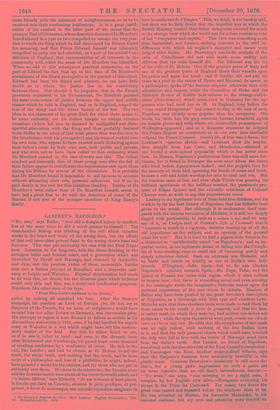PAULI'S " SIMON DE MONTFORT."*
AFTER a long neglect, it seems as if the name and character of Simon de Montfort were destined to occupy a prominent position in the historical literature of the present day. Besides the references to him in the general histories of the time which have recently been published, and which embody the latest results of modern research into that period, there have appeared, or are announced as about to appear, several monographs, enter- ing more in detail into the history and motives of the great Earl of Leicester. The latest of these studies of character, which now lies before us, proceeds from the pen of a writer who has already gained a considerable reputation among students of English his- tory. Although a foreigner, Mr. Pauli seems to regard the insti- tutions of this country with an almost filial reverence and affec- tion, and he has the advantage over most foreigners of being guarded, by his conversance with the original sources of English history, against the absurd errors natural to any one who pro- fesses to give an account of the habits of a nation other than his own. The days of Simon de Montfort are so far removed, in point of time, from the present, that Englishmen and foreigners are pretty much on a par when they attempt to estimate and realise them.
Where so much must be conjectural deduction from the few isolated facts scattered through contemporary records, an intelli- gent foreigner who has studied the period, and is familiar with such documents, may prove a safer guide than a less well-read Englishman ; and it is to be remembered that as we go backwards to the earlier history of nations of similar race, we are more and more likely to find ourselves on platforms common to both, and on which students of both nations may find themselves equally at home. It is not surprising, then, that we are not troubled in Mr. Pauli's pages with the blunders of a stranger or neophyte, and in turn- ing them over we had every reason to hope that we should meet with a thoroughly satisfactory exposition of all that can at pre- sent be ascertained of the career of one of the most important agents in the development of modern civilisation. Instead of this, we are sorry to say we have found a book difficult to read, very confused in the arrangement of facts, and singularly wanting in that backbone of a distinct conception in the mind of the writer of the character of his hero as a whole, which is essential to any successful effort to realise the events of his life to a reader. We have little doubt, indeed, that our author's pages contain nearly every fact of significance which can be re- covered respecting the subject of his memoir, but where is the actual Simon de Montfort whom we expected to have built up for us out of these materials ? He may exist in the author's mind, but if so, he has left him in that state in which, perhaps, he might be best described, after Mr. Matthew Arnold's fashion, as that "which makes for popular representation." To increase this indistinctness, and render still more heavy the painful duties of a critic, Mr. Pauli speaks to us through the medium of a so- called translator, whose idea of her vocation seems to be that of picking out the English of German words from a dictionary, one
* Simon de Montfort, Earl of Leicester, the Creator of the House of Commons. By Reb2hold Pauli. Translated by Una M. Goodwin. With Introduction by Harriet Martineau. London: Triibner and 0o. 1876. by one, and leaving the result to the unaided intelligence of her readers. Whatever language Miss Goodwin may think she has attained in her rendering of Mr. Pauli, she has certainly not suc- ceeded in presenting us with many sentences in the English tongue, if by that we are to understand an arrangement of words and sentences which is easily understood by an ordinary English- man. It is a serious injury to the interests of literature when a work of such a character is intruated to such incompetent hands. Miss Martineau's preface to the work is well and clearly written, and is interesting from its being probably one of the last productions of her pen, but it is of too general a character to call for any especial reference on our part. The "Life of Simon de Montfort" has yet to be written, and we do not think we shallbe far wrong in adding that the time is not yet come when it can be properly written. At present, at any rate, the materials at our disposal are very scanty, and too much is left to inference and conjecture to offer a safe basis for any absolute conclusions. All that we can do is to direct attention to slew salient points, which we think must be regarded as leading landmarks in any atte,napt to sketch his character.
In the first place, his mind was formed by circumstances of a European rather than of an insular cast. Whatever the prejudices may have been that he thus imbibed, they were not especially English, and he approached the field of English politics with a mind wholly unbiassed, at any rate in the direction of English popular feeling. Whatever bias there was in his mind must have lain on the side of Royal authority and Court privileges. If he afterwards became the leader and representative of English national sentiment, he must have become so either through a strong personal conviction of its truth and justice, slowly acquired by close observation of passing events, or with the wilful purpose of making use of popular discontent for his own personal, ambitious ends. We must choose between these alternatives, and it seems to us a great defect in Mr. Pauli's book that, while speaking in general of the disinterested patriotism and high moral character of De Montfort, he throws in every now and then vague accusa- tions of ambition and self-seeking, without attempting to support these epithets by any specific facts ; and then, a sentence or two later, returns to his unreserved panegyric as if no such im- putation had ever been cast by him. If he really thought that De Montfort was then animated by merely selfish motives, he should have modified his previous and subsequent praises of him, and not have left his character to the mercy of these unexplained and seemingly-haphazard reflections. Another important point to. be kept well in mind in forming our estimate of De Montfort is that his reputation rests not merely on the popular verdict of both clergy and laity, but on the sustained judgment of such men as Grosseteste and Walter de Cantilupe, of the leaders of the Order of Friars, which especially represented at that time reformation and progress, of the University of Oxford, and even, during the part of his career, of LOWS IX. of France, whose appre- ciation of right and the right men has given him such a remark- able moral position in the history of that age. The common people loved the Earl during his life, and lamented him as a martyr to the liberties of England. The clergy regarded him as the truest friend of the real interests of religion, and (though informally) canonised him as a saint ; the learned statesman- bishops advised with him and sympathised with him on the basis of a common high morality ; the University threw all the weight of its influence and the enthusiasm of its younger members on his side, and St. Louis again and again pronounced judgment in his favour against imputations supported by the whole weight of Henry M.'s authority, and of the Earl's feudal and personal enemies. Nor did he abandon De Montfort ultimately, except on the ground of his having restrained unduly the Royal power, or in other words, having been too entirely an English patriot. Another point in the career of Simon de Montfort which seems to be established is that though he acted so often as the leader of the greater Barons of England, he never identified himself so entirely and exclusively with their interests as a class as to shut out from his view the rights of other classes in the community. In reading Mr. Pauli's pages, one cannot help feeling that if the great Earl had devoted himself abso- lutely to any one interest in the State, he might have escaped to a great extent, the difficulties and the desertion that he encountered. But he preferred the wider view of a statesman and a patriot, and by insisting on keeping in view the varying interests of all parties, fell a victim at last to a combination formed upon no common principle, except that of resentment excited by his opposition to the gratification of separate selfish interests. Though a shrewd man in many respects, De Montfort failed to. make friends with the mammon of =righteousness, so as to be received into their everlasting habitations. It is a great justifi- cation of his conduct in the latter part of his career that the younger Earl of Gloucester, whose desertion destroyed Be Montfort, found himself in a year or two compelled to assume the very posi- tion towards the King which he had denounced his former friend for assuming, and that Prince -Edward himself was ultimately compelled to carry out and establish, as a part of the settled Con- stitution of England, that representation of all interests in the community with which the cause of De Montfort was identified. When we add to this subsequent practical recantation on the part of Edward the fact that up to the time of De Montfort's curtailment of the Royal prerogative in the pursuit of this object, Edward had been his friend and admirer, we can have little doubt as to where the justice lies in the controversy between them. Nor should it be forgotten that in the French provinces entrusted to his Government, De Montfort pursued the same even course of justice between the upper and middle classes which he held in England, and as in England, reaped the love of the many and the bitter hatred of the few. The two blots in the character of the great Earl, for which there seems to be some authority, are his violent temper on certain extreme occasions (which led him to descend to undignified and disre- spectful altercation with the King, and thus probably fostered more dislike in the mind of that weak prince than was due even to the interference with his prerogative) and his want of control over his own sons, who appear to have created much M-feeling against -their father's cause by their own acts, both public and private, and who seem not to have been called to that reckoning which De Montfort exacted in the case of every one else. The violent conduct and miserable fate of these young men after the fall of their father appear to corroborate the imputations cast upon them -daring his lifetime by several of the chroniclers. It is probable that De Montfort found it impossible to call his sons to account without alienating their own personal adherents, but if so, he paid dearly in the end for this mistaken timidity. Dislike of De Montfort's sons, rather than of De Montfort himself, seems to have had a great deal to do with the desertion of some of the Barons, if not also of the younger members of King Henry's family.



































 Previous page
Previous page